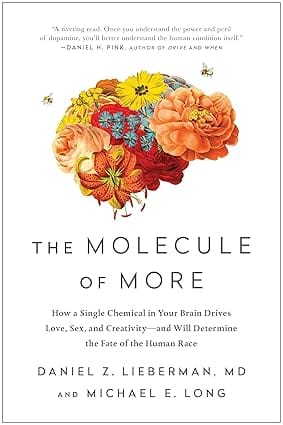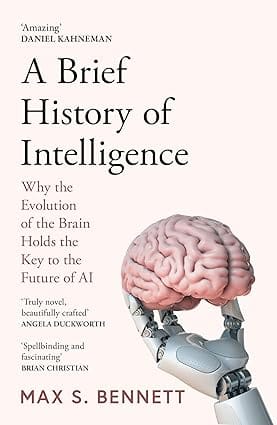WELCOME TO MIDLAND BOOK SHOP!
SHOP FOR
- Contemporary Fiction
- Contemporary Fiction
- Children
- Children
- Comics & Graphic Novels
- Comics & Graphic Novels
- Non-Fiction
- Non-Fiction
- Fiction
- Fiction
Shop No.20, Aurobindo Palace Market, Hauz Khas, Near Church +91 9818282497 | 011 26867121 110016 New Delhi IN
Midland The Book Shop ™
Shop No.20, Aurobindo Palace Market, Hauz Khas, Near Church +91 9818282497 | 011 26867121 New Delhi, IN
+919871604786 https://www.midlandbookshop.com/s/607fe93d7eafcac1f2c73ea4/6468e33c3c35585403eee048/without-tag-line-480x480.png" [email protected]9781948836586 66e57901cb118703196a1f53 The Molecule Of More: How A Single Chemi https://www.midlandbookshop.com/s/607fe93d7eafcac1f2c73ea4/66e57902cb118703196a1f5c/71vvmedzeel-_sy425_.jpg 9781948836586
2020 Next Generation Indie Book Awards Winner - Science Category
2018 Forward Indies Finalist - Psychology Category
Why are we obsessed with the things we want only to be bored when we get them?
Why is addiction perfectly logical to an addict?
Why does love change so quickly from passion to indifference?
Why are some people die-hard liberals and others hardcore conservatives?
Why are we always hopeful for solutions even in the darkest times—and so good at figuring them out?
The answer is found in a single chemical in your brain: dopamine. Dopamine ensured the survival of early man. Thousands of years later, it is the source of our most basic behaviors and cultural ideas—and progress itself.
Dopamine is the chemical of desire that always asks for more—more stuff, more stimulation, and more surprises. In pursuit of these things, it is undeterred by emotion, fear, or morality. Dopamine is the source of our every urge, that little bit of biology that makes an ambitious business professional sacrifice everything in pursuit of success, or that drives a satisfied spouse to risk it all for the thrill of someone new. Simply put, it is why we seek and succeed; it is why we discover and prosper. Yet, at the same time, it's why we gamble and squander.
From dopamine's point of view, it's not the having that matters. It's getting something—anything—that's new. From this understanding—the difference between possessing something versus anticipating it—we can understand in a revolutionary new way why we behave as we do in love, business, addiction, politics, religion—and we can even predict those behaviors in ourselves and others.
In The Molecule of More: How a Single Chemical in Your Brain Drives Love, Sex, and Creativity—and will Determine the Fate of the Human Race, George Washington University professor and psychiatrist Daniel Z. Lieberman, MD, and Georgetown University lecturer Michael E. Long present a potentially life-changing proposal: Much of human life has an unconsidered component that explains an array of behaviors previously thought to be unrelated, including why winners cheat, why geniuses often suffer with mental illness, why nearly all diets fail, and why the brains of liberals and conservatives really are different.
2018 Forward Indies Finalist - Psychology Category
Why are we obsessed with the things we want only to be bored when we get them?
Why is addiction perfectly logical to an addict?
Why does love change so quickly from passion to indifference?
Why are some people die-hard liberals and others hardcore conservatives?
Why are we always hopeful for solutions even in the darkest times—and so good at figuring them out?
The answer is found in a single chemical in your brain: dopamine. Dopamine ensured the survival of early man. Thousands of years later, it is the source of our most basic behaviors and cultural ideas—and progress itself.
Dopamine is the chemical of desire that always asks for more—more stuff, more stimulation, and more surprises. In pursuit of these things, it is undeterred by emotion, fear, or morality. Dopamine is the source of our every urge, that little bit of biology that makes an ambitious business professional sacrifice everything in pursuit of success, or that drives a satisfied spouse to risk it all for the thrill of someone new. Simply put, it is why we seek and succeed; it is why we discover and prosper. Yet, at the same time, it's why we gamble and squander.
From dopamine's point of view, it's not the having that matters. It's getting something—anything—that's new. From this understanding—the difference between possessing something versus anticipating it—we can understand in a revolutionary new way why we behave as we do in love, business, addiction, politics, religion—and we can even predict those behaviors in ourselves and others.
In The Molecule of More: How a Single Chemical in Your Brain Drives Love, Sex, and Creativity—and will Determine the Fate of the Human Race, George Washington University professor and psychiatrist Daniel Z. Lieberman, MD, and Georgetown University lecturer Michael E. Long present a potentially life-changing proposal: Much of human life has an unconsidered component that explains an array of behaviors previously thought to be unrelated, including why winners cheat, why geniuses often suffer with mental illness, why nearly all diets fail, and why the brains of liberals and conservatives really are different.
About the Author
Daniel Z. Lieberman, M.D. is professor and vice chair for clinical affairs in the Department of Psychiatry and Behavioral Sciences at George Washington University. Dr. Lieberman is a Distinguished Fellow of the American Psychiatric Association, a recipient of the Caron Foundation Research Award, and he has published over 50 scientific reports on behavioral science. He has provided insight on psychiatric issues for the U.S. Department of Health and Human Services, the US Department of Commerce, and the Office of Drug and Alcohol Policy, and has discussed mental health in interviews on CNN, C-SPAN, and PBS. Dr. Lieberman studied the Great Books at St. John's College. He received his medical degree and completed his psychiatric training at New York University.
Trained as a physicist, Michael E. Long is an award-winning speechwriter, screenwriter, and playwright. As a playwright
Trained as a physicist, Michael E. Long is an award-winning speechwriter, screenwriter, and playwright. As a playwright
in stockINR 1279
1 1
Email ID already exists!
Your Current password is incorrect
Password Updated Successfully
Thanks for your Feedback
- Home
- Science Technology And Medicine
- The Molecule Of More: How A Single Chemi
The Molecule Of More: How A Single Chemi
ISBN: 9781948836586
₹1,279
₹1,599 (20% OFF)SIZE GUIDE
Sold By: Hauz Khas - Aurobindo Market
Details
- ISBN: 9781948836586
- Author: Daniel Z Lieberman
- Publisher: Benbella
- Pages: 240
- Format: Paperback
Book Description
2020 Next Generation Indie Book Awards Winner - Science Category
2018 Forward Indies Finalist - Psychology Category
Why are we obsessed with the things we want only to be bored when we get them?
Why is addiction perfectly logical to an addict?
Why does love change so quickly from passion to indifference?
Why are some people die-hard liberals and others hardcore conservatives?
Why are we always hopeful for solutions even in the darkest times—and so good at figuring them out?
The answer is found in a single chemical in your brain: dopamine. Dopamine ensured the survival of early man. Thousands of years later, it is the source of our most basic behaviors and cultural ideas—and progress itself.
Dopamine is the chemical of desire that always asks for more—more stuff, more stimulation, and more surprises. In pursuit of these things, it is undeterred by emotion, fear, or morality. Dopamine is the source of our every urge, that little bit of biology that makes an ambitious business professional sacrifice everything in pursuit of success, or that drives a satisfied spouse to risk it all for the thrill of someone new. Simply put, it is why we seek and succeed; it is why we discover and prosper. Yet, at the same time, it's why we gamble and squander.
From dopamine's point of view, it's not the having that matters. It's getting something—anything—that's new. From this understanding—the difference between possessing something versus anticipating it—we can understand in a revolutionary new way why we behave as we do in love, business, addiction, politics, religion—and we can even predict those behaviors in ourselves and others.
In The Molecule of More: How a Single Chemical in Your Brain Drives Love, Sex, and Creativity—and will Determine the Fate of the Human Race, George Washington University professor and psychiatrist Daniel Z. Lieberman, MD, and Georgetown University lecturer Michael E. Long present a potentially life-changing proposal: Much of human life has an unconsidered component that explains an array of behaviors previously thought to be unrelated, including why winners cheat, why geniuses often suffer with mental illness, why nearly all diets fail, and why the brains of liberals and conservatives really are different.
2018 Forward Indies Finalist - Psychology Category
Why are we obsessed with the things we want only to be bored when we get them?
Why is addiction perfectly logical to an addict?
Why does love change so quickly from passion to indifference?
Why are some people die-hard liberals and others hardcore conservatives?
Why are we always hopeful for solutions even in the darkest times—and so good at figuring them out?
The answer is found in a single chemical in your brain: dopamine. Dopamine ensured the survival of early man. Thousands of years later, it is the source of our most basic behaviors and cultural ideas—and progress itself.
Dopamine is the chemical of desire that always asks for more—more stuff, more stimulation, and more surprises. In pursuit of these things, it is undeterred by emotion, fear, or morality. Dopamine is the source of our every urge, that little bit of biology that makes an ambitious business professional sacrifice everything in pursuit of success, or that drives a satisfied spouse to risk it all for the thrill of someone new. Simply put, it is why we seek and succeed; it is why we discover and prosper. Yet, at the same time, it's why we gamble and squander.
From dopamine's point of view, it's not the having that matters. It's getting something—anything—that's new. From this understanding—the difference between possessing something versus anticipating it—we can understand in a revolutionary new way why we behave as we do in love, business, addiction, politics, religion—and we can even predict those behaviors in ourselves and others.
In The Molecule of More: How a Single Chemical in Your Brain Drives Love, Sex, and Creativity—and will Determine the Fate of the Human Race, George Washington University professor and psychiatrist Daniel Z. Lieberman, MD, and Georgetown University lecturer Michael E. Long present a potentially life-changing proposal: Much of human life has an unconsidered component that explains an array of behaviors previously thought to be unrelated, including why winners cheat, why geniuses often suffer with mental illness, why nearly all diets fail, and why the brains of liberals and conservatives really are different.
About the Author
Daniel Z. Lieberman, M.D. is professor and vice chair for clinical affairs in the Department of Psychiatry and Behavioral Sciences at George Washington University. Dr. Lieberman is a Distinguished Fellow of the American Psychiatric Association, a recipient of the Caron Foundation Research Award, and he has published over 50 scientific reports on behavioral science. He has provided insight on psychiatric issues for the U.S. Department of Health and Human Services, the US Department of Commerce, and the Office of Drug and Alcohol Policy, and has discussed mental health in interviews on CNN, C-SPAN, and PBS. Dr. Lieberman studied the Great Books at St. John's College. He received his medical degree and completed his psychiatric training at New York University.
Trained as a physicist, Michael E. Long is an award-winning speechwriter, screenwriter, and playwright. As a playwright
Trained as a physicist, Michael E. Long is an award-winning speechwriter, screenwriter, and playwright. As a playwright
User reviews
NEWSLETTER
Subscribe to get Email Updates!
Thanks for subscribing.
Your response has been recorded.

India's Iconic & Independent Book Store offering a vast selection of books across a variety of genres Since 1978.
"We Believe In The Power of Books" Our mission is to make books accessible to everyone, and to cultivate a culture of reading and learning. We strive to provide a wide range of books, from classic literature, sci-fi and fantasy, to graphic novels, biographies and self-help books, so that everyone can find something to read.
Whether you’re looking for your next great read, a gift for someone special, or just browsing, Midland is here to make your book-buying experience easy and enjoyable.
We are shipping pan India and across the world.
For Bulk Order / Corporate Gifting
 +91 9818282497 |
+91 9818282497 |  [email protected]
[email protected]
Click To Know More
INFORMATION
ACCOUNT
QUICK LINKS
ADDRESS
Midland Book Shop - Hauz Khas
Shop No.20, Aurobindo Palace Market, Near Church, New Delhi
Shop No.20, Aurobindo Palace Market, Near Church, New Delhi














